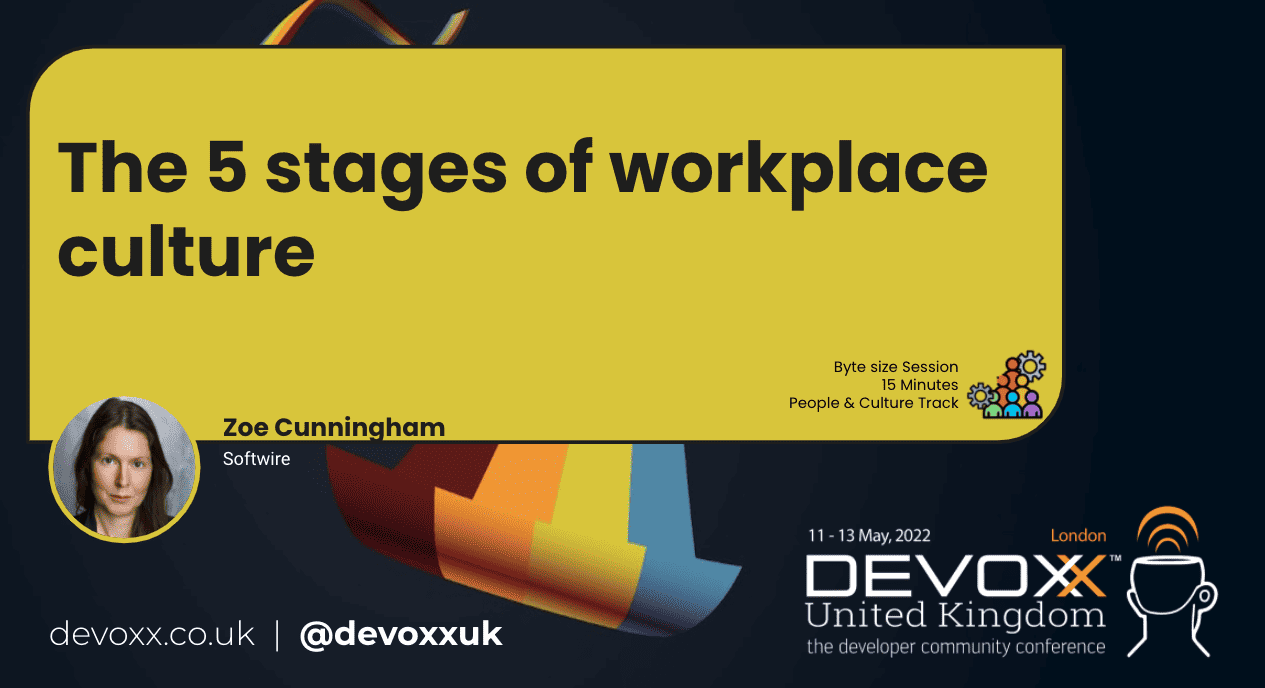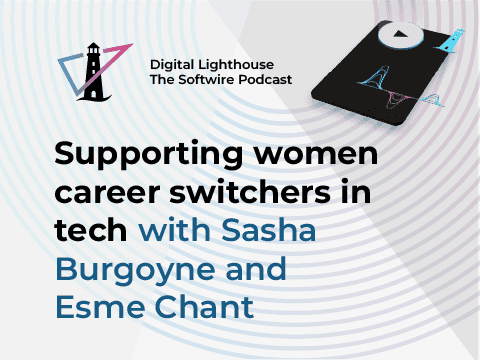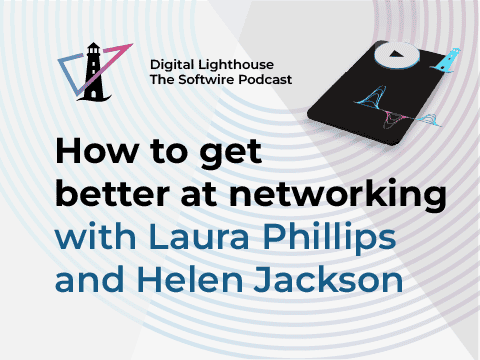
“Culture is the leader who’s in the room when you’re not” is the new phrase currently scaring CTOs and other leaders worldwide.
If you don’t build your culture, your culture will build you. And employees in the tech industry are getting wiser and demanding more – some chocolate biscuits and a go-karting trip are NOT going cut it.
I’ve spent the latter part of my career working full-time on Softwire’s culture. In my role as Managing Director from 2012-2020, the more time I invested in culture, the more I saved elsewhere.
Getting your culture right gets your team on your side, and having your team on your side means that everyone is pulling together to solve molehills before they become mountains.
Distilled into 5 succinct stages, this is my whistle-stop tour of how to build a world-class engineering culture:
Full transcript:
Hi, everyone.
Thanks so much for coming over your lunch to see me talk about culture. And I’m very excited to to come and talk about culture today. Because, while building the best technology that we can is important, we’re not going to be able to do that to the best of our ability unless we’re leading our team in the best way. And culture, I would argue is the most important aspect of that.
So, hello, I’m Zoe Cunningham. This is a picture of me in the olden days when we went in and we’re surrounded by monitors everywhere. I work for a software development agency called Softwire. I started as a coder in the year 2000, so a very long time ago. And I’ve worked my way up through successive leadership roles, until I was the Managing Director from 2012 to 2020.
And in all of those roles, managing teams at various levels, I found that culture is super important and we have really focused on culture. And for us, as an agency, that’s the cause that we’ve always focused on: Being a great place to work. But for us, obviously that’s nice and we want to work for a company that’s great and we want to be able to say people ‘Oh work for us. It’s great’, but it’s (culture) actually a commercial imperative for us.
Because what we have to offer as an organisation is the people who work for us, so retention is the most important challenge for us. And so we’re not able to just pay lip service to culture and being a great place to work. It hits us if we get it wrong.
So, what I want to share with you today is essentially the journey that I’ve been on at Softwire, looking at the different kinds of building blocks of culture, which is why I think of it as the ‘five stages of culture’.
When we started (Softwire started in 2000), I joined just six months after it started. So I’ve kind of been there through the whole journey.
1.Perks
We offer and continue to offer a lot of perks, and I remember when I was applying for jobs, seeing a job advert saying ‘all the chocolate biscuits you can eat’ and I remember as a 21-year-old being like what ‘what is this magic company where you get unlimited chocolate biscuits?’ Obviously, we have evolved.
As all organisations have right, we’ve evolved the perks that we offer. We’ve moved away from just alcohol-based events or snacks in the kitchen to offer home-cooked lunches or to have more family-friendly events. But at the end of the day, these are kind of perks that you get on top of your job as well as a salary. And I think perks are great. Don’t get me wrong. People do join companies to the perks. People do stay at companies for the perks, but it’s not enough.
And it’s very easy to misuse these perks. I once had someone come and say to me ‘I’m really trying to help the leaders of my organisation become a better place to work. And they’ve installed a table football table. And then they’ve given everyone a 15 minute break to use it between 10 and 10:15’. Ooh okay, maybe they’ve got a bit to learn. So perks isn’t enough.
2. Trust
In fact, that brings me on to trust, which is also something that we had from the start and is trickier to achieve than you would think.
So I think everyone is aiming for good personal relationships, which rely on trust and you doing the best for people who work for you. And people who work for you knowing that you’ve got their back, and that you are going to live by what you say, you’re going to mean what you say and you’re going to act on it. And the larger a team you run, the more challenging this is because of communication issues.
Essentially, when we were 10 people in a room, all together, everyone knew what everyone was doing. We all trusted each other because we’re all kind of just people hanging out in a room in a way that you don’t feel when your company is 200 people or your team is 200 people. And this is the aspect of Softwire that when I joined it, it made the most impression on me as being ‘different’ to other organisations. I had a friend who went to work for an oil company and they did not operate in this way.
Whereas I think tech is a fantastic industry, because I think most tech organisations do get this and they get it again because of the business need of making sure that they keep their amazing developers. But despite this being so key and critical, it’s again, not sufficient. It wasn’t sufficient for Softwire, to have the best culture that we could perks and democracy and trust wasn’t enough.
And in fact, one of the things that we offered was something called morale holiday and we still do, where, three days a year, you could organise team events. We organised whole company events. They got more sophisticated as we’ve gone on and we’ve grown. Last year, we had a festival for the first time, which was amazing.
But, offering people three days a year to have fun really misses what are they doing for the other 362! (That’s not how many days you work, but the other days that aren’t those days,!)
3. Work
However much fun and perks and freedom you offer, people are spending the majority of their time for your organisation doing the job that they are paid to do right. So, we had this realisation after we’d been going for a few years of ‘Hold on, hold on, hold on. We’ve really focused on the peripherals around the job and how we do business, but it’s super important to make sure that people are enjoying the day-to-day work that they’re doing’. And we invested a lot of time and energy into what what levers we had to pull in this area.
Again, as a services organisation, we were doing work on behalf of other people. So we were building things in the tech stacks that they needed for that organisation. So we were working with the legacy code that they had, already. And we had limited levers to pull there.
But we have developed quite a sophisticated way of matching people with projects. For some people, a legacy code base fills them with fear and for some people they recognise that this is a super exciting and important challenge that they can get stuck into. So we’ve spent a lot of time, both, working on how we help our clients to embrace a great working environment and also matching people with the right kind of work.
And we really thought we were done at this stage. We’re like, ‘well, hold on, hold on, you know, we’ve got all these amazing extra perks. We’re all great to each other and everyone loves their job. So what more is there that as an organisation we can or should be offering people?’ And actually it turns out that even people who don’t state explicitly that, or people who don’t come across as career minded and like ‘I want to get to the top of the organisation, I want to rule everyone’ (which is what I was like), even people who are happy in their role and doing the job that they are doing, they need a sense of progression.
So as part of our stage three, you know of trust and building relationships and asking people what they wanted, we realised that actually something that everyone wanted, if not a career or if not a hierarchical progression (as it’s not for not everyone. E.g. titles and status are not always what people are looking for) but everyone is looking for a sense of progression and some way of recognising their own development.
4. Career progression
As in, first, having the opportunity to develop and get better, and then recognising that within the organisation.
This led us to rethink a lot of our bad systems and job titles and how we organise teams and how we prioritise technical roles and technical career paths, rather than just new organisational management career paths. When I started, it was like, you were a developer or you’re a project manager and that was your progression and then you could kind of carry on in that direction. But there’s a lot of scope for specialist roles or, or team leadership roles that are really more of a technical nature than an organisation and process nature.
And we found that by implementing this and by having it as something we had in mind for every single person, how they were going to develop and where we could help them get to (not according to our predefined this, this is the way you go, but what did they want to get and how do we help them get there?), we found that really made a difference.
However, still, it still wasn’t enough. And the more we looked into organisational theory (why people do what they do in an organisation team, why people do anything), we realise that the single most important aspect of culture is purpose.
5. Purpose
And for us, I would say this is something that is still a work in progress for us. We’re aware of it. We care about it. We’re trying to trying to improve it and trying to give everyone who works for us a sense of purpose, and I think, much like the other stages, it’s not completely dependent on the things we have in place already.
But the things we have in place already helped us to get here. If you have trust and communication that helps you find out what gives people a sense of purpose and helps you build it into what you do.
But what we found is that there is a difference between doing what you do well, which is what we focused on to date, or making the environment for doing that enjoyable, doesn’t address the question of ‘why are you doing what you’re doing, anyway?’.
So something that we’re quite proud of is our Best Company’s Awards from the Sunday Times. And that for us has really summed up being a great place to work. It’s something that we’ve really focused on.
But being a great place to work isn’t a purpose. It’s really circular. Like ‘we’re a great place to work so that people can work here and make it a great place to work’ but why is any of us doing any of this!? So we’re focusing now more on environmental issues, making sure that organisation is net-zero. But again, this is ‘we’re doing what we’re doing and we’re not producing extra carbon’.
But that still doesn’t address why we’re doing what we’re doing.
I think one of the challenges that we have is that we are an organisation largely comprised of engineers with a leadership that is largely comprised of engineers. And I think that purpose speaks to the best kind of purpose speaks to something a bit non rational within us all. It’s like that, ‘yes, I get that that’s the purpose’. Whereas we try to engineer things and logically work them out and say, ‘well, our purpose must be we make software’, we make it well so ‘our purpose is to make great software’. Well, is it? Is that a great purpose?
So that is pretty much my journey through different stages of culture.
All of it is super challenging, and much harder to do than it is to say, so I think it’s (particularly with something like trust) really easy to say, ‘Oh, you’ve got to trust everyone’ and I think implementing it is super hard.
So I just want to leave with the offer: that if anyone is really particularly interested in culture or in leadership and management or helping teams to be the best they can, I love talking about the stuff. (You can contact Zoe by email: [email protected])
I mean, yeah, I suppose it’s kind of my job and I work as a mentor within Softwire and but I just find it absolutely fascinating. And I think there is such depth as a topic for study and learning. I’m learning all the time.
And yeah, I can’t wait to find out what is stage six! That’ll be that’ll be my next talk! Alright, thank you very much.


